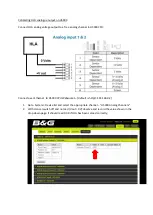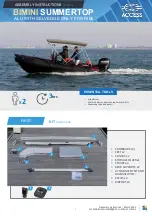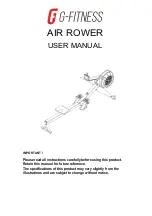
18
POSSIBLE SETBACKS AND RELATIVE SOLUTIONS
A. The motor does not start: make sure that
•
there is fuel in the fuel tank (fig.1 no.1).
•
the fuel tap, if present on the motor, is open.
•
the gas throttle (fig.1 no.3) is set to its START position, if the motor is cold.
•
the gas throttle is not set to its START position, if the motor is hot (this could flood the motor).
•
the gas throttle is not set to its STOP position.
•
the fuel arrives at the carburettor.
•
the air filter is not obstructed (see the motor’s manual).
•
the vent hole on the fuel tap is not obstructed (fig.1 no.1).
•
the sparkplug is capable of providing the necessary spark.
If these inspections should not resolve the problem, please contact your reseller.
B.
The cutter, with its relative activation lever properly engaged, does not turn:
•
check whether the belt is worn.
•
check whether the belt has come off the pulleys.
•
make sure that the lever is able to provide the belt with adequate traction.
C.
The cutter, with its relative activation lever disengaged, continues to turn:
•
check whether the pulley brake is engaged. If this is not the case, remove the cover and loosen the
adjustment until the brake lining makes contact with the edge of the pulley.
•
check whether the brake lining has been consumed.
D.
The machine does not perform properly: check
•
whether the cutter is excessively worn.
•
that the cutter is installed and that it is not broken.
•
whether the air filter (see the motor’s manual) is obstructed, resulting in a significant decrease in motor
power. If this is the case, clean it with compressed air or replace it with a new air filter supplied by your
trusted reseller.
•
whether the fuel tank is almost empty.
•
whether the motor oil level is below its minimum level (fig.1 no.11).
E.
With the advancement lever properly engaged, the machine does not move:
•
if the advancement mechanism’s wire is too loose, adjust it using the appropriate regulator (fig.1 no.5).
•
check whether the transmission belts are excessively worn.
•
check whether the chain is broken or too loose.
•
check whether the clutch disks inside the gearbox are excessively worn.
F.
The machine is abnormally difficult to steer:
•
check whether the handle (fig.12 no.1) is loose.
G.
The cutter’s support does not slide, thereby impeding the replacement of the cutter itself:
•
Clean the mechanism and remove any residues present. (See the section entitled “CLEANING AND
MAINTAINING THE CUTTER SUPPORT”).
•
Make sure that no rust has formed within the system after a certain period of use. (See the section entitled
“CLEANING AND MAINTAINING THE CUTTER SUPPORT”).
H.
The insulation of the buried cable results to be jeopardized:
•
The cable exit hole of the laying tube is damaged. Replace the tube.
•
The tube in which the cable passes through, which is part of the laying tube, is dirty. Proceed to clean it
properly.
NEVER MAKE ANY ADJUSTMENTS TO THE WIRE REGULATORS IF YOU DO NOT KNOW THEIR PURPOSE! SUCH
OPERATIONS COULD COMPROMISE THE MACHINE’S PROPER FUNCTION!
















































